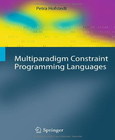Artificial Intelligence eBooks
Download free Artificial Intelligence eBooks
Practical Genetic Algorithms
2nd Edition
* This book deals with the fundamentals of genetic algorithms and their applications in a variety of different areas of engineering and science* Most significant update to the second edition is the MATLAB codes that accompany the text* Provides a thorough discussion of hybrid genetic algorithms* Features more examples than first edition...
Multiparadigm Constraint Programming Languages
Programming languages are often classified according to their paradigms, e.g. imperative, functional, logic, constraint-based, object-oriented, or aspect-oriented. A paradigm characterizes the style, concepts, and methods of the language for describing situations and processes and for solving problems, and each paradigm serves best for programming in particular application areas. Real-world problems, however, are often best implemented by a combination of concepts from different paradigms, because they comprise aspects from several realms, and this combination is more comfortably realized using multiparadigm programming languages. This book deals with the theory and practice of multiparadigm constraint programming languages. The author first elaborat...
Information Theory and Quantum Physics
Physical Foundations for Understanding the Conscious Process
Business Process Execution Language for Web Services BPEL and BPEL4WS
2nd Edition
This book is a comprehensive and practical guide to the design, development, usage, and syntax of Business Process Execution Language (BPEL). BPEL is explained in detail, code snippets and complete examples are used to show how business processes are specified. Two major BPEL servers, the Oracle BPEL Process Manager and Microsoft BizTalk Server, are covered in detail, and an overview of other major BPEL servers is provided. This book is aimed at architects and developers in the design, implementation, and integration phases of advanced information systems and e-business solutions, developing business processes and dealing with the issues of composition...
The Myths of Security
What the Computer Security Industry Doesn't Want You to Know
If you think computer security has improved in recent years, The Myths of Security will shake you out of your complacency. Longtime security professional John Viega, formerly Chief Security Architect at McAfee, reports on the sorry state of the industry, and offers concrete suggestions for professionals and individuals confronting the issue. Why is security so bad? With many more people online than just a few years ago, there are more attackers -- and they're truly motivated. Attacks are sophisticated, subtle, and harder to detect than ever. But, as Viega notes, few people take the time to understand the situation and protect themselves accordingly. This book tells you:Why it's easier for bad guys to "own" your computer than you think Why a...
2007 - 2017 © eBooks-IT.org





